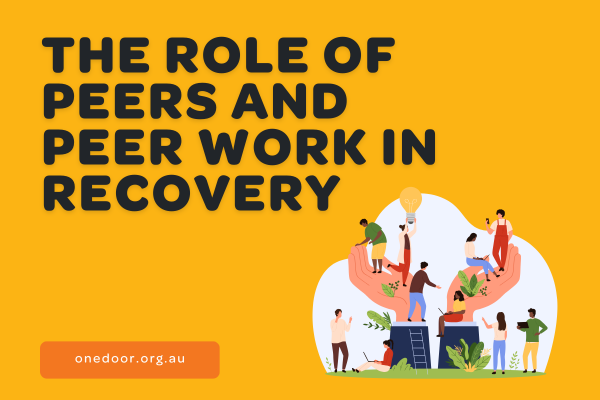
Blog authors:
Dr Djuna Hallsworth, Support Group Peer Leader at One Door Mental Health djuna.hallsworth@onedoor.org.au.
The role of peers and peer work in recovery
“Peer work” refers to the work undertaken by someone with a similar personal, “lived experience” background to the people in the community they serve. In the mental health sector, this usually means someone directly affected by a mental health condition or suicide attempt, though a person with lived experience may also be a family member or partner who has taken on the role of a carer, or a person who has been indirectly affected by suicide. Peer work is a broad term that encompasses a range of roles and responsibilities, and fits into the “lived experience workforce” which the Australian Mental Health Commission predicts will be a crucial part of Australia’s continual economic and societal health, as well as its commitment to improving mental health services for all.
“Peer work” and “lived experience work” are terms that are sometimes used interchangeably, though their meanings differ slightly. The National Lived Experience (Peer) Workforce Development Guidelines (2021) describe lived experience workers as those who “build relationships based on collective understanding of shared experiences, self-determination, empowerment, and hope.” Peer workers are defined in the Fifth National Mental Health and Suicide Prevention Plan (2017) as those that “provide valuable contributions by sharing their experience of mental illness and recovery with others.” Although there is significant overlap, the implication is that peer workers effect change through front-line engagement and the sharing of their story. Roles that require lived experience, on the other hand, might not be client-facing, and may not involve explicitly communicating one’s own journey. While terminology varies across contexts, the 2021 Workforce Development Guidelines highlight that the preferred umbrella term for work that draws upon one’s personal interaction with the mental health sector is “lived experience”.
Increasingly, though, the term “lived expertise” is used to distinguish first-hand knowledge of, in this case, a mental health condition, from the application of the wisdom and skills acquired through living through difficult circumstances. According to the Mental Health Commission, lived expertise “arises from a lived experience is of equal value to other types of expertise, including academic qualifications.”i While everyone has their own unique lived experience, lived expertise specifically describes the practising of one’s skills and knowledge to achieve better outcomes for organisations and the community. It is crucial to note, though, that despite the use of this terminology throughout Australian government reports and plans, it is not necessarily appropriate for all communities and cultural groups, including Indigenous Australians, for whom the Gayaa Dhuwi (Proud Spirit) Declaration has been created.
The government’s new emphasis on building diversity into the workforce empowers people with a lived experience of a mental health condition (or the experience of caring for someone who does) to gain employment and apply their unique skills and knowledge to their role. Crucially, lived experience workers are also able to bridge the historically wide gap between those accessing services, resources, and support systems, and those designing and providing these. This is significant because people with mental health conditions have often been excluded from the workforce—and particularly from senior or management positions—on account of stigma, lack of flexible conditions, and compounding difficulties related to accessing medical care and housing. As a result, support services often lacked the perspective of those for whom they were created.
As outlined in the 2017 Prevention Plan mentioned above, peer and lived experience workers are essential to breaking down stereotypes, reducing stigma, informing policy, and enhancing collaboration between service providers and the community.ii When peer workers are engaged in community-facing roles, such as in group leadership or one-to-one support roles, they can act as a role model and demonstrate that recovery is possible by sharing their journey. The sense of hope that such work can instil—particularly in people with people who may see recovery as unattainable, or who believe their situation is unique or unusual—is quite powerful. Deputy Commissioner at the NSW Mental Health Commission Tim Heffernan describes his experience both within the mental health system and as an advocate for improved mental health outcomes in One Door’s quarterly podcast Free Your Mind. Tim’s interview highlights the profound value of integrating the voices of those with a first-hand perspective the systems and services that both the government and communities are looking to change for the better.
It's worth noting that a lot of peer work is, in fact, undertaken on a voluntary basis and often begins at a grassroots level. Indeed, many of One Door’s social support groups are run by trained volunteer carers and lived experience peer leaders on the basis that such groups provide mutual support to both leaders and members. These communities offer welcoming, non-judgemental connections with folks from similar backgrounds and are open to all, without the need for a referral or NDIS package. To find out if there is a group near you, visit our Support Groups page.
ihttps://www.mentalhealthcommission.gov.au/lived-experience/lived-experience-workforces/peer-experience-workforce-guidelines/national-lived-experience-(peer)-workforce-develop/clarity-understanding-lived-experience-work/chapter-1-achieving-integrated-regional-planning-a
iihttps://www.mentalhealthcommission.gov.au/sites/default/files/2024-03/the-fifth-national-mental-health-and-suicide-prevention-plan-2017.pdf